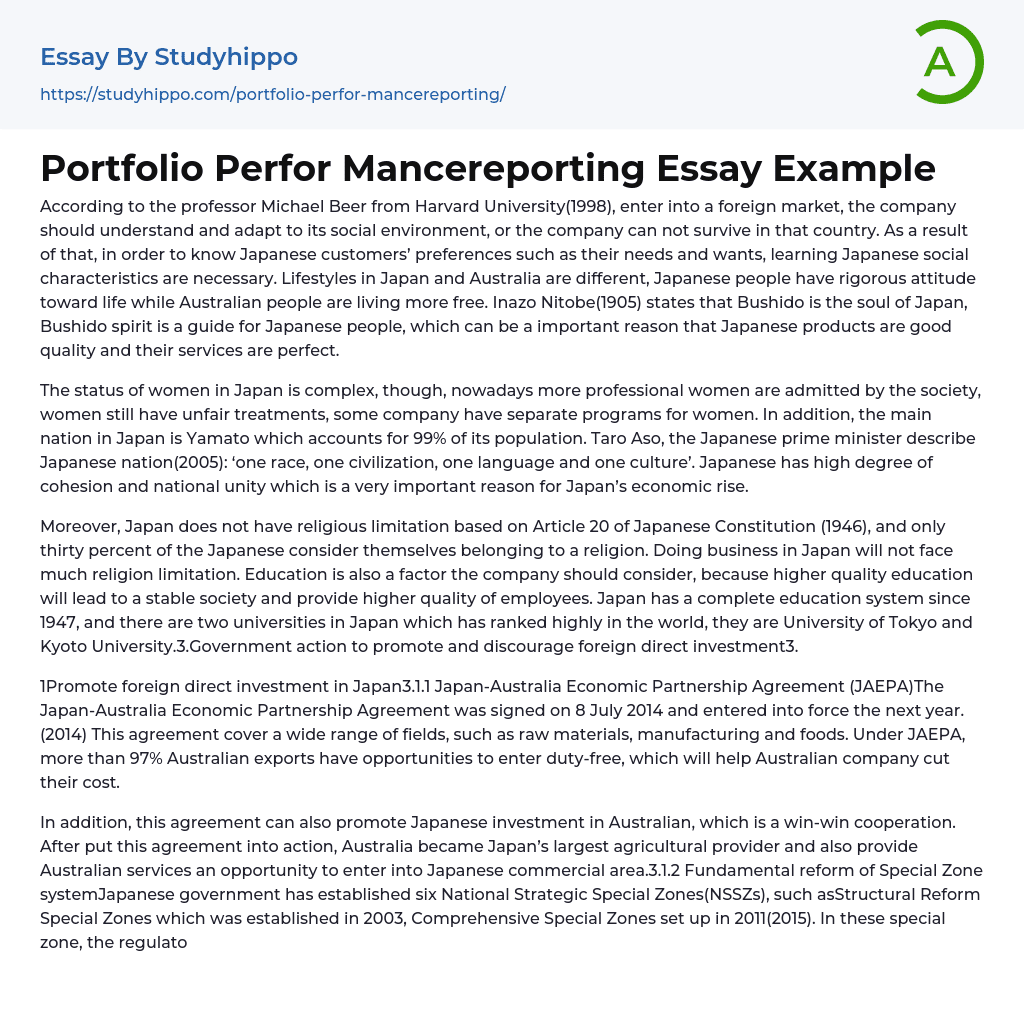According to Harvard University's Professor Michael Beer (1998), successful entry into foreign markets requires an understanding and adaptation to their social environment. To effectively reach Japanese customers, it is important to study their strict lifestyle in comparison to Australians who tend to live more freely. Inazo Nitobe (1905) suggests that Japan's essence is embodied by Bushido, which serves as a guide for its people. This may be why Japanese products are known for their high quality and impeccable service.
Despite increased acceptance, professional women in Japan still face complex and unequal status. Unfair treatment persists, with some companies even implementing separate programs for them. Additionally, 99% of Japan's population belongs to the Yamato ethnic group. Former Prime Minister Taro Aso once emphasized Japan's strong cohesion and national unity - built upon one race, civilization, language, and culture- as a major c
...ontributor to its economic success.
The Japanese Constitution's Article 20, established in 1946, allows for business operations in Japan regardless of religion. This is reinforced by the fact that only thirty percent of Japanese citizens identify with any religion. In order to succeed in the Japanese market, businesses should prioritize education as it contributes to stable societies and better employees. Japan has maintained a comprehensive education system since 1947 which includes highly-regarded universities such as the University of Tokyo and Kyoto University. Additionally, foreign direct investment can be encouraged or discouraged by the Japanese government.
The Japan-Australia Economic Partnership Agreement (JAEPA) was signed on July 8, 2014 and put into effect the next year. The objective of this agreement is to increase foreign investment in Japan across various sectors such as manufacturing, food, and raw materials. By providin
duty-free access to more than 97% of Australian exports, JAEPA has the potential to decrease expenses for businesses in Australia.
Not only does this agreement encourage Japanese investment in Australia, but it also benefits both countries. As a result of the agreement, Australia has become Japan's primary agricultural supplier, while Australian services have gained access to the Japanese commercial market. Part of this agreement involves a restructuring of Japan's Special Zone system, which includes the creation of six National Strategic Special Zones. The regulatory measures and tax treatments in these special zones differ from those outside of them, and the government provides financial support for them.
Japan has implemented the Special Zone system to augment its global competitiveness and encourage more foreign direct investment. Additionally, the Council to promote foreign direct investment was established in 2015 under the Prime Minister's direction. Its objective is to overhaul the investment initiation process and offer essential assistance to overseas investors.
The Japan External Trade Organisation (JETRO) is another related organization that focuses on promoting mutual trade and foreign direct investment. They provide foreign investors with extensive information, expert advice, and free temporary office space. Additionally, the Japanese government has made five promises to attract foreign business.
Various initiatives are being implemented in Japan to attract foreign investment. These include offering foreign language services at stores, providing free public wireless Lan to foreign investors, establishing airports that can accommodate business jets, ensuring access to quality education for the children of foreign investors, and providing consultancy services for foreign investment from both the Japanese and local governments. However, despite these efforts, certain industries in Japan remain under the monopoly of the government,
leading to restrictions on foreign direct investment.
According to the Japanese foreign investment guide (2015), certain industries are monopolistic, such as water supply, postal services, arms, atomic energy, explosives, aerospace and aviation. In addition, foreign investors in the telecommunication industry can only hold up to 30% of voting rights. However, the Japan business law handbook (2014) states that foreign private companies have the right to establish and own businesses in Japan and engage in profitable activities.
The Japanese government has the responsibility to ensure that foreign investment companies operate lawfully as per Article 821 of the 2005 company law. Hence, Australian companies can establish joint ventures and wholly-owned subsidiaries in Japan.
- Asset essays
- Capital market essays
- Day Trading essays
- Depreciation essays
- Discounted Cash Flow essays
- Foreign Direct Investment essays
- Funds essays
- Futures Trading essays
- Internal Rate Of Return essays
- Million essays
- Revenue essays
- Bangladesh essays
- China essays
- Hong Kong essays
- India essays
- Japan essays
- Kuala Lumpur essays
- Malaysia essays
- Manila essays
- Pakistan essays
- Philippines essays
- Singapore essays
- Vietnam essays
- Vietnamese essays
- American Dream essays
- Barriers To Entry essays
- Capitalism essays
- Central Bank essays
- Compensation essays
- Consumerism essays
- Economic Development essays
- Economic Growth essays
- Economic Inequality essays
- Economic System essays
- Economy essays
- Employment essays
- Export essays
- Finance essays
- Free Trade essays
- Gross Domestic Product essays
- Human Development essays
- Income Inequality essays
- Industry essays
- Inflation essays
- International Business essays
- International Trade essays
- Macroeconomics essays
- Materialism essays
- Max Weber essays
- Microeconomics essays




